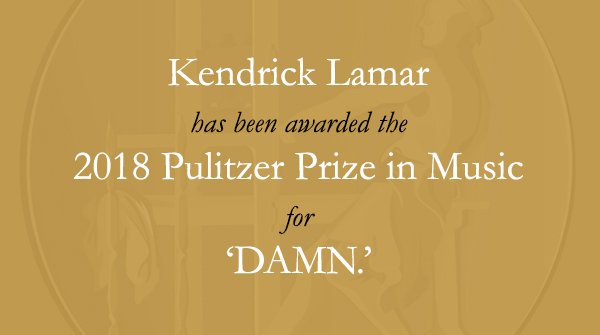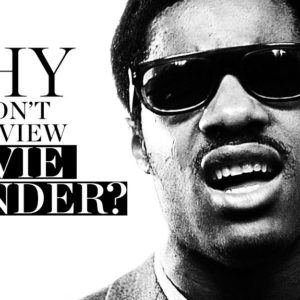Featuring new voices from academia and beyond, Fresh Wax is MusiQology’s way to provide contributions from academics, artists, and writers at large. This week’s writer, making his MusiQology debut reporting live from Kendrick Lamar’s Pulitzer Prize award ceremony, is Simon Ghebreyesus.
Last month, I was sitting in a cavernous room with the words Law, Philosophy, Medicine, and Theology inscribed into the walls. The room, which lies in the center of Columbia University’s Low Library, seemed more like the Roman Pantheon than a college administrative building. In the room, hundreds gathered in suits and dresses to celebrate the recipients of 2018’s Pulitzer Prizes, the 101st such time superlative excellence would be named, declared, and celebrated. This year, as luminaries gathered to deliver one such award, something ran through the room like an electric current. Murmurs and whispers ebbed and flowed. Something big was happening. Everyone in the room knew that it was a monumental day in the history of an award that has always purported to seek to acknowledge superlative achievement. A change had come in what that could mean. It was the day Kendrick Lamar would receive the Pulitzer Prize for music.
Historically, this prestigious prize has only been awarded to classical compositions, with only three jazz works scattered throughout: Wynton Marsalis’ Blood on the Fields (1997), Ornette Coleman’s Sound Grammar (2007), and Henry Threadgill’s In for a Penny, In for a Pound (2016). All three artists were longstanding lions of the jazz genre, well-established in their careers (and far past their primes) with these awards unofficially serving as recognition of long careers of excellence rather than zeitgeist-impacting achievement.
And of course, besides these jazzmen, the otherwise strict genre limitation (highly favoring classical compositions) led to a dramatic lack of black Pulitzer recipients. In the 72 years the award has been handed out, Kendrick is only the fifth black artist to hoist it. Miles Davis, Michael Jackson, and so many others were overlooked for the prize meant to reward “distinguished musical composition.” A certain plateau—reserved for the highest excellence in music—was unreachable for black artists and their art, itself.
And yet here we were, with hip-hop moving from the streets to the studio to the Low Library. Despite the genre’s dramatic move to the center of the American popular cultural center, I never thought that this award—which always felt archaic to me—would ever find its way to hip-hop. Why would it? Why now, when cultural lines in the sand seem to be cutting deeper and dividing us more, would a slow-moving institution be ready for change? I truly felt this award would never be added to a rapper’s legacy, but I certainly doubted it would be any time soon if it would.
Still, there I was, lucky enough to be present when the Compton-raised rapper Kendrick Lamar walked up onto the stage to accept the award for his album DAMN. The juxtapositions of the situation were palpable: In a room full of mostly rich, white men in suits and ties, here was Kendrick Lamar, accompanied by Jay Rock and other family and friends, some dressed in sweatshirts celebrating Lamar’s Top Dawg Entertainment (TDE) record label, Los Angeles Lakers jerseys, and red TDE beanies. When you take a minute to consider the ways our spaces are policed—dress codes, noise violations—and the racial valence of such spatial politics, it made the moment even more jarringly poetic.
The Pulitzers describe DAMN. as “a virtuosic song collection unified by its vernacular authenticity and rhythmic dynamism that offers affecting vignettes capturing the complexity of modern African-American life,” a fancy way of suggesting that they felt the record taught them something…that it reached across boundaries and did so without catering to them or compromising. That they were able to find something redeeming in it at all—just as I had—suggests a broadness of the work’s import that I had not realized before.
Still, as a disciple in the Church of Kendrick, I felt that he was where he belonged in that room. Kendrick’s music has been fundamentally important to my life and my experience as a music lover. Section .80, his 2011 debut, was the first album I ever listened to all the way through. I think Good Kid, m.A.A.d. City is the greatest rap album of all time. To Pimp a Butterfly reignited my musical exploration by fusing jazz, funk, and hip-hop to challenge my conception of strict genre lines. And DAMN. was the soundtrack to my 2017 because of the way Kendrick used personal narratives to examine black life in America. No one expected a rapper to win a Pulitzer, but if it was going to happen, no one was more fitting than Kendrick. And if anyone was going to capture the fragility, uncertainty, and complexity of America in 2017, no one was more fitting than Kendrick.
The duality Kendrick brought with him to the room that day is what makes him so special. He occupies a vaguely delineated niche as both a global superstar and somewhat of a recluse. His raps echo that status, using personal narratives and experiential reflections to speak to the larger struggles and triumphs facing his own community in Los Angeles and, at the same time, blacks across the nation and the wider diaspora. Lamar does not chase the spotlight—rather, his music demands it. I’d argue he has never conceded a single inch of ground or compromised his art to reach the heights he has climbed, a quality that makes the validation of his Pulitzer victory that much sweeter (and especially considering the GRAMMYs continued sidelining of his work into raced categories despite its idiosyncratic universality). He did it his way. And for such a historically white and traditionally regressive prize in music, he never once ceased pushing the boundaries of his artistry and challenging the very structures that have kept the Pulitzer in the past. Lamar talked about the importance of his artistic vision in a 2016 interview, saying that he wouldn’t let “no type of boundary” impede his mission of “speaking on things that [he] feel[s] people that don’t have voices can speak on.”
Kendrick Lamar’s Pulitzer win is a feat he achieved by staying true to himself, and his win is a testament to the transcendent power of his work that penetrates the most seemingly unbreakable barriers. His power as a translator has been displayed magnificently in the past, notably at his 2016 GRAMMYs performance, where he traded prison shackles for djembe drums and sought liberation on stage. The performance shed all constraints, actively drawing lines between Compton and Africa and calling on ancestral narratives to alleviate the burden of subjugation.
And to be selfish for a minute, his win means so much to people like me, raised on his themes, moved by his words, and feeling a kind of validation of the genius we saw at the beginning. This win was vindication for all the times I praised Kendrick before the world had caught up. This win was confirmation that the seeds he and others and those before them have sewn might bear fruit in even the most sanitized and whitewashed spaces. This level of recognition for hip-hop didn’t come soon enough, and too many important artists came and went without any consideration. But I’m just glad that the moment came at all. It’s been a long time coming.
So, there I was, sitting in that expansive room, glued to my chair by the gravity of the moment. The prize for music was awarded at the very end of the ceremony, so I spent the hour leading up to the award somewhat distractedly nibbling on the provided meal of burrata, chicken and mushrooms, and chocolate mousse cake (all Compton staples, of course). I watched journalists, authors, and photographers take the stage for their incredible accomplishments (bringing down Harvey Weinstein and other abusers; relentlessly investigating the Trump administration; documenting the horrors of Charlottesville; and so much more). Still, my mind was elsewhere. My thoughts were cloudy, muddled by anticipation and emotion. This was really happening. Columbia president Lee Bollinger read the final citation of the ceremony, interrupted in the middle by applause. Then, in a library built in 1895, at a university with a $10 billion endowment, at a ceremony for a claustrophobically white award, Kendrick Lamar, a rapper from Compton and a griot of black life, accepted the Pulitzer Prize for music. Who could have imagined this day would come?
Simon Ghebreyesus is a rising sophomore in the Yale College class of 2021. He plans to double major in African American Studies and Art History, and in his free time he writes for and edits his own music writing website, music-university.net. Follow him on Instagram: @simon.ghe


 Share On Facebook
Share On Facebook Tweet It
Tweet It




